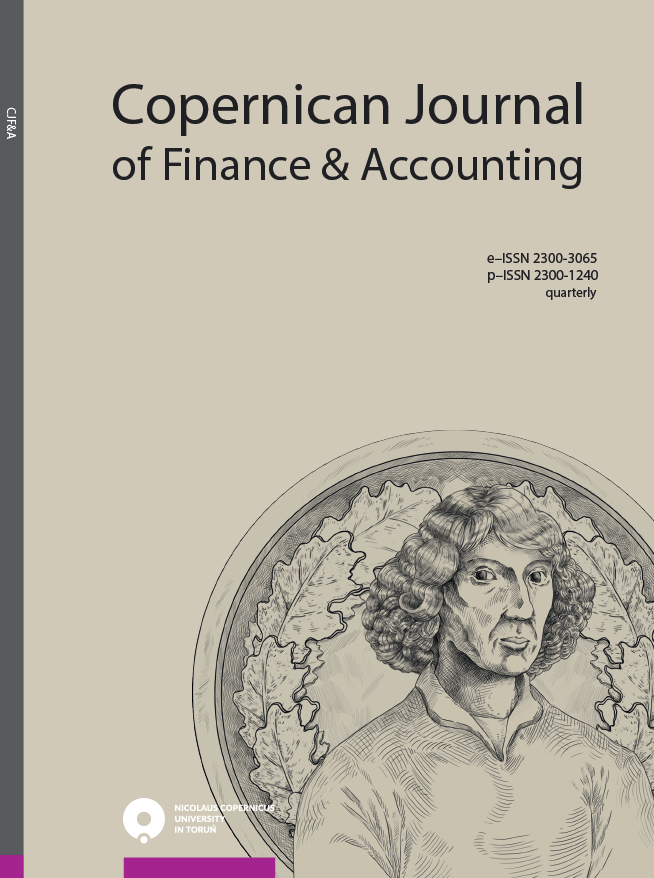Financial Inclusion Towards Financial Stability in Ghana: Insights from Quantile Regression Analysis
DOI:
https://doi.org/10.12775/CJFA.2025.003Keywords
financial inclusion, financial stability, cointegration quantile regression, GhanaAbstract
In Ghana, only 52.7% of the population is fully financially included in the formal financial system. However, while financial inclusion is often linked to economic resilience and stability, as it can broaden access to financial services and reduce vulnerability, its direct, quantifiable impact, particularly at different quantile levels, remains largely untested in the sub-Saharan African context. This study addresses this gap by employing quantile regression analysis to examine the impact of financial inclusion on Ghana’s financial stability, using time-series data from 2005 to 2021. The results show significant cointegration between the variables, indicating that the independent variables act as long-run forcing factors for financial stability. The long-run analysis shows that financial inclusion positively affects financial stability, especially at higher quantiles. These findings highlight the need to consider various quantile levels in national financial assessments. The study suggests prioritizing financial inclusion during periods of low financial stability because of its positive correlation with strengthening a country’s financial landscape, which can aid in economic resilience and sustainability in Ghana and many sub-Saharan African countries.
References
Ahamed, M.M., & Mallick, S.K. (2019). Is Financial Inclusion Good for Bank Stability? International evidence. Journal of Economic Behavior & Organization, 157, 403–427. https://doi.org/10.1016/j.jebo.2017.07.027.
Anokye, M.A., & Peterson, O.J. (2017). Financial Econometrics, An Example-Based Handbook. New York: Nova Science Publishers Inc.
Anthony-Orji, O., Orji, A., Ogbuabor, J.E., Mba, P.N., & Onwe, I.E. (2021). Financial Inclusion and Financial Stability in Nigeria: A New Empirical Evidence. Journal of Xi’an Shiyou University, Natural Science Edition, 17(12), 138–160.
Antwi, F., Kong, Y., & Gyimah, K.N. (2024). Financial Inclusion, Competition and Financial Stability: New Evidence from Developing Economies. Heliyon, 10(13), e33723. https://doi.org/10.1016/j.heliyon.2024.e33723.
Atellu, A.R., & Sule, P.W.M.O. (2019). Financial Stability in Kenya. Does Inclusive Finance Matter? Journal of Economics and Sustainable Development, 10(6), 55–79. https://doi.org/10.7176/JESD/10-6-07.
Babar, S., Latief, R., Ashraf S., & Nawaz, S. (2019). Financial Stability Index for the Financial Sector of Pakistan. Economies, 7(3), 81. https://doi.org/10.3390/economies7030081.
Babatunde, A.A. (2024). Demand Side Factors and Financial Inclusion: The Mediating Role of Financial Self-efficacy. Copernican Journal of Finance & Accounting, 13(2),29–45. http://dx.doi.org/10.12775/CJFA.2024.006.
Camara, I., & Diallo, I. (2020). Financial Sector Development and Economic Growth: The Case of ECOWAS Countries. In: D. Seck (ed.). Financing Africa’s Development. Advances in African Economic, Social and Political Development. Springer: Cham. https://doi.org/10.1007/978-3-030-46482-0_8.
Canlas, D., Ravalo, J.N., & Remolona, E.M. (2025). Do Small Bank Deposits Run More than Large Ones? Three Event Studies of Contagion and Financial Inclusion. Journal of Financial Stability, 78, 101417. https://doi.org/10.1016/j.jfs.2025.101417.
Cull, R., Ehrbeck, T.D., & Holle, N. (2014). Financial Inclusion and Development: Recent Impact Evidence (English). Washington, DC: World Bank Group. http://documents.worldbank.org/curated/en/269601468153288448 (accessed: 15.12.2024).
Danisman, G.O., & Tarazi, A. (2020). Financial Inclusion and Bank Stability: Evidencefrom Europe. European Journal of Finance, 26(3), 1–14. https://doi.org/10.1080/1351847X.2020.1782958.
Daoud, J.I. (2017). Multicollinearity and Regression Analysis. Journal of Physics: Conference Series, 949, 012009. https://doi.org/10.1088/1742-6596/949/1/012009.
Demirgüç-Kunt, A., & Klapper, L.F. (2012). Financial Inclusion in Africa: An Overview. World Bank Policy Research Working Paper, No. 6088, Available at SSRN: https://ssrn.com/abstract=2084599.
Djoufouet, W.F., & Pondie, T.M. (2022). Impacts of Fintech on Fnancial Inclusion: The Case of Sub-Saharan Africa. Copernican Journal of Finance & Accounting, 11(4),69–88. http://dx.doi.org/10.12775/CJFA.2022.019.
Feghali, K., Mora, N., & Nassif, P. (2021). Financial Inclusion, Bank Market Structure, andFinancial Stability: International Evidence. The Quarterly Review of Economics and Finance, 80, 236–257. https://doi.org/10.1016/j.qref.2021.01.007.
Frimpong, S., Yusuf, M.A., Boateng, E., Ankomah, K., & Abeka, M.J. (2023). Financial Inclusion, Economic Freedom and Financial Stability in sub-Saharan Africa. Thunderbird International Business Review, 65(4), 429–441. https://doi.org/10.1002/tie.22341.
Ibrahim, S., Mazlina, A.R., Azman-Saini, W.N.W., & Zakaria, M.F.M. (2016). Financial Integration – Growth Nexus: A Quantile Regression Analysis. The Journal of Economic Integration, 31(3), 531–546. https://doi.org/10.11130/jei.2016.31.3.531.
Kamal, A., Hussain, T., & Khan, M.M.S. (2021). Impact of Financial Inclusion and Financial Stability: Empirical and Theoretical Review. Liberal Arts and Social Sciences International Journal (LASSIJ), 5(1), 510–524. https://doi.org/10.47264/idea.lassij/5.1.33.
Kamara, A.K. (2024). The Impact of Financial Inclusion on Economic Growth and Poverty Reduction: Empirical Evidence from sub-Saharan Africa. International Journal of Science and Business, 32(1), 16–33. https://doi.org/10.58970/IJSB.2292.
Koenker, R. & Hallock, K. (2001). Quantile Regression. Journal of Economic Perspectives,15, 143–156. http://dx.doi.org/10.1257/jep.15.4.143.
Koenker, R., & Bassett, G.J. (1978). Regression Quantiles. Econometrica, 46(1), 33–50. https://doi.org/10.2307/1913643.
Koudalo, Y.M.A., & Toure, M. (2023). Does Financial Inclusion Promote Financial Stability? Evidence from Africa. Cogent Economics & Finance, 11 (2), 2225327. https://doi.org/10.1080/23322039.2023.2225327.
Le, T.H., Chuc, A.T., & Taghizadeh-Hesary, F. (2019). Financial Inclusion and its Impacton Financial Efficiency and Sustainability: Empirical Evidence from Asia. Borsa Istanbul Review, 19(4), 310–322. https://doi.org/10.1016/j.bir.2019.07.002.
Moeti, D., & Sin-Yu, H. (2024). Effects of Financial Inclusion on Financial Stability: Evidence from SSA Countries. Munich Personal RePEc Archive (MPRA), Paper No. 120238.
Neaime, S., & Gaysset, I. (2018). Financial Inclusion and Stability in MENA: Evidence from Poverty and Inequality. Finance Research Letters, 24, 230–237. https://doi.org/10.1016/j.frl.2017.09.007.
Olusegun, T.S., Evbuomwan, O., & Belonwu, M.C. (2021). Does Financial Inclusion Promote Financial Stability in Nigeria? Economic and Financial Review, 59(1), 77–99.
Pesaran, M.H., Shin, Y., & Smith, R. (2001). Bounds Testing Approaches to the Analysisof Level Relationships. Journal of Applied Econometrics, 16(3), 289–326. https://doi.org/10.1002/jae.616.
Sackitey, D. (2024). 52.76% of Ghanaians multidimensionally financially included –Report, https://citinewsroom.com/2024/06/52-76-of-ghanaians-multidimensionally-financially-included-report/? (accessed: 14.11.2024).
Saunders, M., Lewis, P., & Thornhill, A. (2012). Research Methods for Business Students. Harlow: Pearson Education Ltd.
Vo, D.H., Van, L.T.H., Dinh, L.T.H., & Ho, C.M. (2020). Financial Inclusion, Corporate Social Responsibility and Customer Loyalty in The Banking Sector in Vietnam. Journal of International Studies, 13(4), 9–23. https://doi.org/10.14254/2071-8330.2020/13-4/1.
World Bank. (2021). Progress and Obstacles: Financial Inclusion in Africa. World BankGroup. https://thedocs.worldbank.org/en/doc/d6a96c32453175806ed5633e924db6de-0050062025/original/SSA-Progress-and-Obstacles-Note.pdf. (accessed 06.01.2025).
Yangdol, R., & Sarma, M. (2019). Demand-side Factors for Financial Inclusion: A Crosscountry Empirical Analysis. International Studies, 56(2–3), 163–185. https://doi.org/10.1177/0020881719849246.
Downloads
Published
How to Cite
Issue
Section
License
Copyright (c) 2025 Philomina Maku Narh, Collins Dodzi Dzitse

This work is licensed under a Creative Commons Attribution-NoDerivatives 4.0 International License.
Stats
Number of views and downloads: 236
Number of citations: 0



